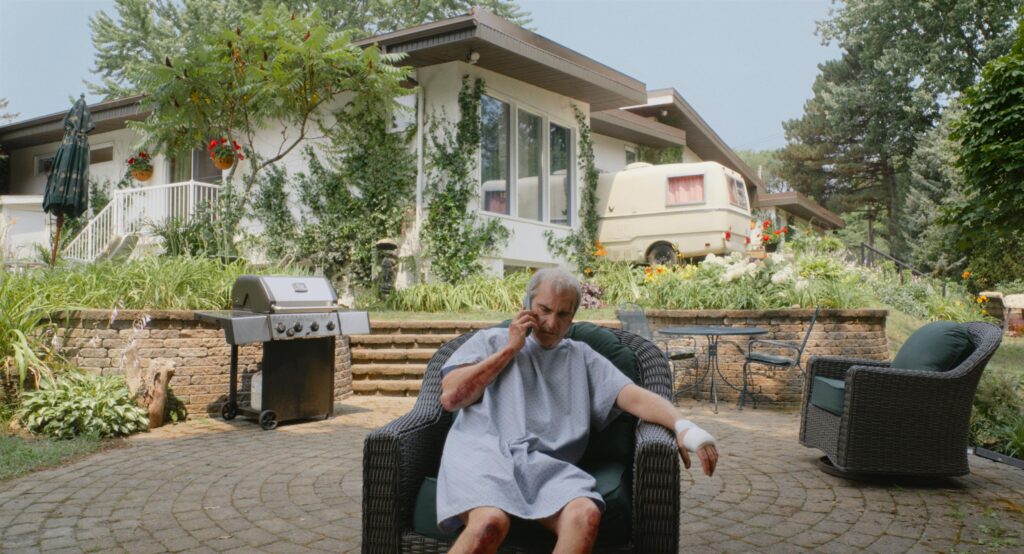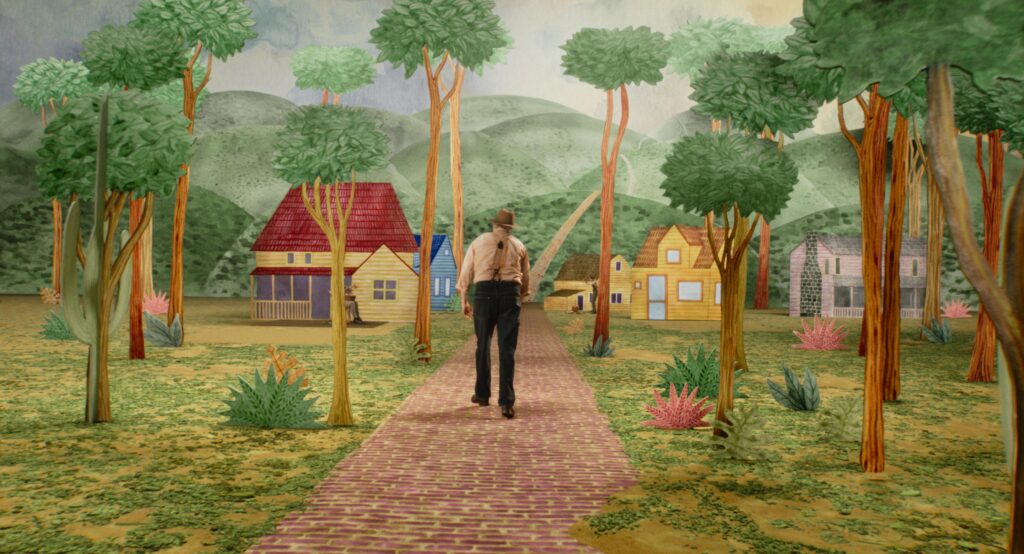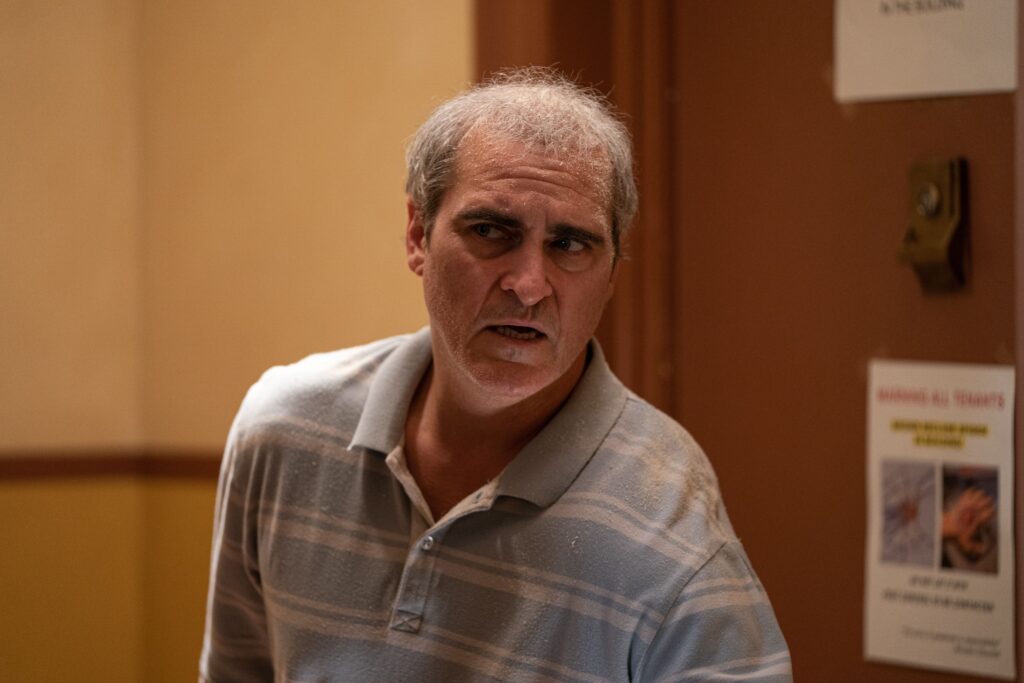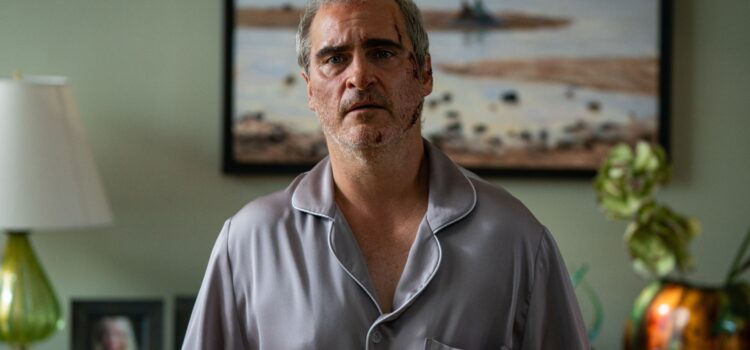By Alex McPherson
An imaginatively sadistic plunge into a tortured psyche, Ari Aster’s “Beau Is Afraid” is a grueling watch, but one that’ll wind up impossible to forget, for better and worse.
The film unfolds through the eyes of Beau Wassermann (Joaquin Phoenix), a middle-aged man-child with near-paralyzing guilt and anxiety stemming from Mommy Issues. He lives in a run-down apartment within a city overrun with crime and squalor. Onlookers livestream a suicide attempt; a dead body is left in the street for days on end; a psycho known as “Birthday Boy Stab Man” lives up to his namesake; lewd graffiti adorns any available wall; Beau’s elevator practically catches fire anytime it’s used; a Brown Recluse spider roams inside Beau’s apartment building (the list goes on and on… and on, reveling in bad taste and reactionary fears). It’s an urban hellscape straight out of a conservative’s nightmares. And oh, that naked man gouging someone’s eyes out across the street? He’ll come for you next, especially if you’re unlucky enough to be Beau.
Portrayed with sadness and numbed passivity by Phoenix, who looks beaten down by the “reality” that surrounds him, Beau is supposed to visit his business-titan mother, Mona (played in the present-day by Patti LuPone and by Zoe Lister-Jones in flashbacks), on the anniversary of his father’s death. It’s clear, however, that there’s tension between them, driven home by Mona’s palpable passive-aggressiveness to Beau’s timidity on the phone. After posing the question of whether Beau ever feels the urge to kill his mother, Beau’s therapist (Stephen McKinley Henderson), prescribes Beau a “cool new drug” to calm his nerves — stating that it must be taken with water, or else.
Through a Rube-Goldbergian chain of events involving sudden tragedy, lost house keys, and plenty of bloodshed, a butt-naked Beau is hit by a car driven by suburban couple Grace (Amy Ryan) and Roger (a hilarious Nathan Lane), who care a bit too much and nurse him back to health in their daughter’s bedroom, much to the daughter’s chagrin. Nothing’s ever easy for poor Beau, and proceedings only get crazier from there. Pressure mounts for Beau to return to Mona as soon as possible, or, at least, for him to “grow up” in a world that aggressively resents his existence, all while we viewers watch him suffer for our entertainment.

Indeed, Aster’s latest passion project is a nerve-wracking, visually inventive, and strangely repetitive piece of work. It’s full of his usual flair for the grotesque presented in vivid detail, but self-indulgent to a fault, as seeing the world through the eyes of a person so profoundly unstable for three hours becomes an endurance test.
“Beau Is Afraid” isn’t a “horror” film likes Aster’s previous efforts (including “Hereditary” and the masterful “Midsommar”), but there’s plenty of nightmare fuel on display, dressing up its shocking sights and sounds as pitch-black comedy where the ultimate punchline is the loss of hope. We’re all just passive observers, watching Beau undergo numerous trials as an inverted hero’s journey where his trauma is an all-encompassing prison that informs his every waking moment.
And whew boy, does “Beau Is Afraid” lean into trippiness. Like his other films, Aster takes full advantage of the medium’s stylistic possibilities to make “Beau Is Afraid” a disorienting experience. Scenes progress with a twisted dream logic. A turn of the head can launch Beau into a different time and place, and heinous acts of callousness take place in the background, treated with the absolute driest of deadpan humor. An encounter with a wandering theater troupe seemingly predicts Beau’s possible future, transitioning the film into an extended animated segment straight out of a messed-up storybook, and specific childhood memories come crashing into the present at random intervals — intrusive thoughts that Beau’s mind is trying to make sense of, to no avail.
Pawel Pogorzelski’s cinematography frames the absurdity with unflinching precision, using long takes that let the craziness simmer, if not be processed in a timely manner. The film’s sound design is also outstanding, amplifying sources of Beau’s fear and occasionally rendering voices like hissing daggers piercing sides of the screen.
Whether or not the film’s satirical, phantasmagorical imagery is taking place in the “real world” or not isn’t the point — “Beau Is Afraid” is uncompromisingly framed through Beau’s eyes, as we witness his every fear and anxious thought manifested in his moment-to-moment experiences; informed by a narcissistic parent whose overprotectiveness and blatant manipulation has left him being a vulnerable punching-bag in a world rife with cruelty, both at micro and macro scales.

So, yes, “Beau Is Afraid” is worth watching in a theater if possible. Story-wise, though, it’s a more complicated beast, largely boiling down to Beau’s lack of agency and Aster’s refusal to provide catharsis. Phoenix is typically great in the role, but Beau isn’t the sort of individual who undergoes much of a traditional arc during the runtime, which makes his terror-stricken reactions and fever-pitched paranoia redundant after a while. We want him to change, to stand up for himself, but “Beau Is Afraid” doesn’t care, and as much as the film engages stylistically, it ends up bloated and unwieldy. This is especially true of the third act, which piles on reveals and even more ghoulishness that, by that point, doesn’t hit with much force thanks to the relentless, numbing happenings preceding them.
Perhaps Aster’s making the point that Beau’s trauma is inescapable — turning the camera back at us to point out how we’re indulging in his travails; the screen on which we view the film itself reflects Beau’s lack of freedom from his mother. There’s no solace or comfort in Beau’s reality, and, in a sense, within Aster’s film overall.
“Beau Is Afraid” is a difficult film to grade as a result — the tedium is intentional, driving its points home with oppressive force and leaving plenty of doors open to additional interpretation (such as the power corporations have over daily life). It’s just that in the process of conveying these themes, Aster tells a bitterly cynical yarn that leans into mercilessness and fatalism over telling a satisfying, compelling narrative in itself. Three hours is too long for such an ordeal, and “Beau Is Afraid” forgets to put as much care into its characters as the funhouse of chaos it puts them in.
All of this combines to make “Beau is Afraid” Aster’s weakest film to date. Regardless, you’ve never seen anything truly like it before: a gargantuan swing for the fences that should be commended for its confidence and bravado alone.

“Beau Is Afraid” is a 2023 horror comedy directed by Ari Aster and starring Joaquin Phoenix, Patti LuPone, Zoe Lister-Jones, Amy Ryan, Nathan Lane, and Stephen McKinley Henderson. It is rated R for strong violent content, sexual content, graphic nudity, drug use, and language, and the runtime is 179 minutes. It opened in theaters April 21. Alex’s Grade: B.
Alex McPherson is an unabashed pop culture nerd and a member of the St. Louis Film Critics Association.

